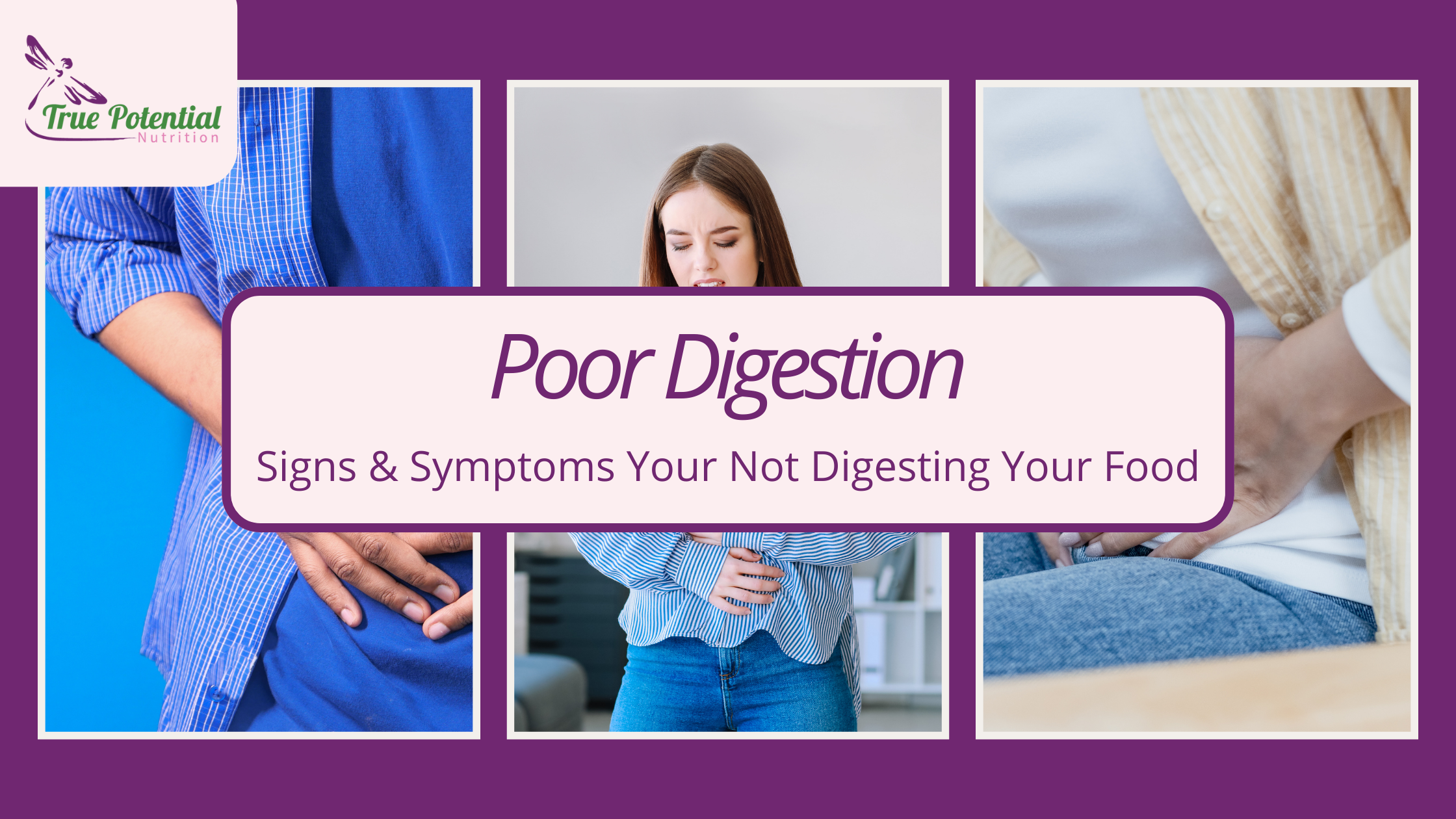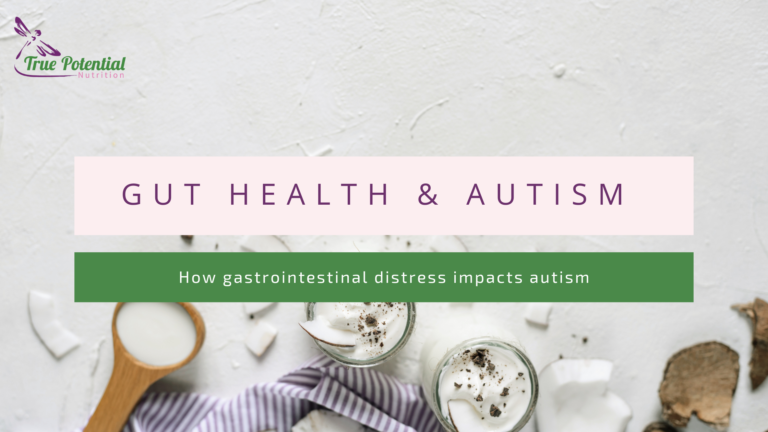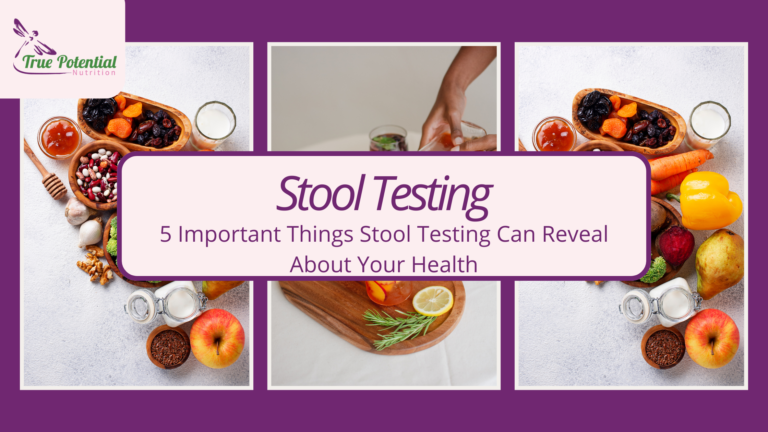By Danielle MacDowell M.S., CNS, LDN, M.Ed, BCBA, LABA

Main Takeaways
- Maldigestion is when the body is unable to properly break down food and extract the nutrients from it.
- Maldigestion can result in fatigue, anxiety, depression, hormonal issues, metabolic disturbances and joint pain, amongst other things.
- Symptoms of maldigestion include bloating & gas, fatty stools, heartburn, belching, diarrhea, feeling uncomfortably full after small meals, food particles in stools, and persistent GI pain.
- GI symptoms are very common, they are not normal.
- Using tools, such as stool testing and an elimination diet can help to determine root cause of maldigestion.
- Stool testing can assess for aberrations in digestion, inflammation, bacterial abundance, and metabolism. It can also be used to assess for inflammatory bowel disease, cancer, and parasites, amongst other things.
- Maldigestion can be the result of digestive enzymes, acid, and/ or bile insufficiency or lifestyle factors, such as rushed eating and stress.
Table of Contents
You might be eating, but are you actually digesting your food?
Does this sound familiar….?
You sit down to eat because you are tired and hungry. You are hoping to get a much needed energy boost only to end up on the other side of your meal with bloating and gas. And, to boot, not only did you NOT get the energy you were hoping to get from your food, but you are still tired. So, what gives? You may have something called maldigestion…
What is Maldigestion?
Maldigestion (aka poor digestion) is when the body in unable to properly break down food. For this reason, the body is unable to obtain the nutrients it needs to fulfill it’s many roles. As a result of the limited nutrient resources, it is not uncommon for individuals with maldigestion to also have fatigue, anxiety, depression, hormonal issues, and metabolic disturbances, amongst other things.
The nutrients that is needed to keep the body functioning optimally is vast. So, when there are nutrient deficiencies, the body is going to break down somewhere…And, this breakdown varies across individuals.
Not having nutrients in our body and expecting it to continue to fire on all cylinders is like expecting to bake a cake without all of the ingredients…It’s not going to happen.
So, getting to the bottom of poor digestion is essential to restoring health.
Common Signs & Symptoms of Poor Digestion
- Bloating & Gas
- Fatty Stools
- Heartburn
- Belching
- Diarrhea
- Feeling uncomfortably full after small meals
- Food particles in stools
- Persistent GI pain
Poor Digestion: Common But Not Normal
Is Bloating and Gas Normal?
In short, no. If you have any of the above symptoms, you may be like many others who have adopted the above symptoms as their norm. While these symptoms are very common, they are not normal. Meaning, when your digestion system is working properly, these symptoms should not be present. This is why getting to the root cause of symptoms is incredibly important. Not only will it help relieve these GI issues, but it will increase your nutrient load, and therefore, your overall health.
Bloating, Gas And Pain: An Ongoing Sauga
There are often two scenarios that I see in my practice…
Scenario one: A client comes in to see me after being told that the root cause of their symptoms is unclear. They were also not given a direction on how to find the root cause behind their symptoms. So, they are left in the dark about next steps and resolution.
Scenario two: A client comes into to see me after being given a diagnosis and placed on medication. However, in spite of this, they STILL have symptoms.
Both of these scenarios can be equally distressing, especially after years of ongoing symptoms. If either one of these scenarios resonates with you, detective work may be warranted.
While this may seem intimidating or daunting, it can be worth your while, especially if you are able to nail down the culprit that is causing your symptoms.
There are a couple ways to do determine the root cause of symptoms, including:
- Stool testing *link to sample report
- The elimination diet
What is Stool Testing?
Before we dive into what a stool test can reveal, let’s first discuss what a stool test actually is. As the name implies, a stool test is an assessment that involves analyzing a sample of a person’s stool. This allows the practitioner to identify signs of disease, inflammation, maldigestion, and infection.
This type of testing can provide important information about the health of a person’s digestive system, as well as other aspects of their overall health. In the conventional medicine world, stool testing is typically used to diagnose gastrointestinal infections, inflammatory bowel disease, and colon cancer.
In the functional medicine world, practitioners will use this tool for both diagnostic purposes and to look for aberrations in digestion, inflammation, bacterial abundance, and metabolism. Both types of practitioners also use stool testing to look for parasites, blood in the stool, and other abnormalities.
How is Stool Testing Done?
Curious about the process? A small sample of stool is collected and sent to a laboratory for analysis. Sometimes the stool sample is collected at home while other times it’s collected at the doctor’s office. Depending on the test, results are released anywhere between a couple hours to couple weeks.
Poor Digestion & Stool Testing
A stool panel is a great tool to determine if maldigestion is present. It can not only determine if the pancreas is functioning well enough to produce enzymes, but it can pinpoint how well the body is digesting fats and proteins. This is important because each macronutrient (carbs, fats, proteins) requires different digestive materials to be broken down. For example, fat requires bile acids and lipases to be broken down while protein requires proteases and HcL to be broken down. So, getting granular on where digestion is breaking down can be helpful in targeting intervention. Comprehensive stool testing will often assess the following markers of maldigestion:
- Products of Protein
- Breakdown
- Fecal Fats
- Pancreatic Elastase
Poor Digestion Detected: Now What?
Now that you have a better understanding of what is not getting digested, you can pinpoint the interventions needed. Let’s quickly talk about why maldigestion happens in the first place.
Maldigestion can happen when there are deficiencies in:
- Enzymes
- Stomach acid
- Bile
Impaired digestion can also be a result of lifestyle factors, such as:
- Eating on the go
- Not chewing properly
- Eating when stressed
It can also occur as a result of inflammation, gallstones, and various health conditions.
As you can see there are several causes behind maldigestion, which is why working with a practitioner can help you target specific interventions to support healthy digestion and to help you nurture your health.
Final Thoughts and Main Takeaways
Maldigestion is when the body is unable to properly break down food and extract the nutrients from it. This is problematic because not only does it create a constellation of symptoms, such as gas, bloating, GI pain, but the body is unable to get the nutrients it needs to support health.
What’s more, is that maldigestion can result in fatigue, anxiety, depression, hormonal issues, metabolic disturbances and joint pain, amongst other things. When maldigestion is in question, a stool test can provide information to the provider and client so that an individualized intervention plan can be created to resolve symptoms and improve digestion.
*Interested in a stool test? See below to see how True Potential Nutrition can support your needs.
1:1 Consultations and Functional Testing with True Potential Nutrition
I am a functional nutritionist, specializing in gut health, inflammation, mental health, autoimmunity, hormones, and metabolism. If you are looking for personalized nutrition recommendations or functional testing, such as a stool test, visit this link to set up a free discovery call to find out how I can help you reach your health and wellness goals.
*As always, if you are considering making any changes to medications, supplements, diet, or lifestyle, reach out to your practitioner so that they can guide you through the process.




